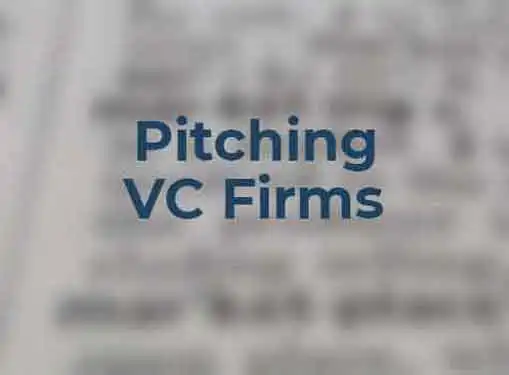Venture Capital Funding
Pitching a Venture Capitalist
Written by James Garvin for Gaebler Ventures
Ever wonder what it's really like to pitch a venture capitalist? Below is a perspective from a pitch meeting at a Top 5 Venture Capital firm on Sand Hill Rd. in the heart of Silicon Valley. Read this article to find out what really goes on in a pitch meeting.
Like most venture capital meetings, this meeting was arranged through a personal contact.

One of the partners at this Top 5 VC firm happens to be a business partner with the founder of a new medical device company seeking its first round of funding. It is almost unheard of for any entrepreneur to secure a pitch meeting at a top VC firm with out a personal reference or recommendation from someone inside the VC firm's network.
Upon arrival to the VC firm, we were kindly greeted and immediately brought into the conference room to set-up the projector and presentation. At exactly 3pm, one of the VC partners walked in to greet everyone.
There were no formal questions to start, the VC was all eyes and ears as the presentation got underway. Within only 30 seconds of the start of the presentation, the VC politely interrupted to ask his first question. What is the potential size of this market? The questions and comments continued at what seemed to be 30 second intervals, however, the questions were all relevant and intended to bring out critical information that would be the basis of the VC's investment decision. So what exactly does a top VC want from a new venture?
1. Market Size
This Venture Capital firm had a $500MN fund that they had to turn into $2BN in 7 years and could only invest in businesses that would help it move their needle toward $2BN. In other words, the business opportunity has to be > $1BN to even be considered for an investment. Typically this is screened out before you ever even get a meeting with a VC, but be prepared to back up your numbers and market size estimation.
2. Gross Margins
Gross margins are a very critical ratio for entrepreneurs and for venture capitalists. Obviously, the higher the better, but you'll need to justify exactly how you plan on achieving your gross margin targets. Depending on the industry, gross margins will need to be above 50%, but if you're working in the biotech, medical device, or IT industry, margins should be higher than 70% to successfully lure venture capitalist's interest.
3. Who is on the team?
Once the financial metrics have been reviewed, the next critical Q&A came regarding the founding team. In this company's case, they strongly lacked a VP of Sales & Marketing, or someone who could help them create and execute a sound go-to marketing strategy. This certainly isn't a deal breaker, since the founders had excellent experience in the medical industry to date, but the VC make it clear that they would need to find a rock-star VP of Sales & Marketing, something most VC's are more than willing to help entrepreneurs do.
Overall, the meeting was relaxed and interesting. There were as many laughs around the table as there were questions about financial projections. In this case, the venture capitalists were very polite and direct with their questions. They wanted brevity and direct answers to their questions, simply because you are on the clock and have only 1 hour (in some cases it may be 30 minutes), so use your time wisely and be direct to get the important information across. Lastly, do not take it personally if you do not get funded, most venture capitalists do not fund new ventures, not because they are not a great company or have strong potential, but because it merely is not the right deal for the VC firm.
James Garvin began his education studying biotechnology. In recent years he has turned his interest in technology to helping two internet startup companies. The first business was an online personal financial network and the second was an e-marketing platform created to help entrepreneurs demo their web sites. Currently a student at University of California Davis, James is spending his summer incubating two new online businesses and writing about his entrepreneur experiences.
Share this article
Additional Resources for Entrepreneurs


Conversation Board
We greatly appreciate any advice you can provide on this topic. Please contribute your insights on this topic so others can benefit.